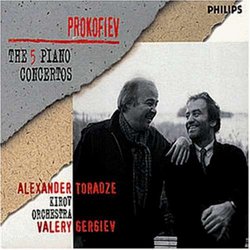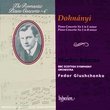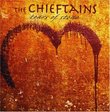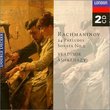| All Artists: Sergey Prokofiev, Valery Gergiev, Alexander Toradze Title: Prokofiev: The Five Piano Concertos Members Wishing: 1 Total Copies: 0 Label: Philips Release Date: 3/17/1998 Genre: Classical Styles: Forms & Genres, Concertos, Instruments, Keyboard, Symphonies Number of Discs: 2 SwapaCD Credits: 2 UPC: 028946204825 |
Search - Sergey Prokofiev, Valery Gergiev, Alexander Toradze :: Prokofiev: The Five Piano Concertos
 | Sergey Prokofiev, Valery Gergiev, Alexander Toradze Prokofiev: The Five Piano Concertos Genre: Classical
|
Larger Image |
CD DetailsSimilarly Requested CDs
|
CD ReviewsBrilliant Playing; Brilliant Concertos Christopher Forbes | Brooklyn,, NY | 11/22/2003 (5 out of 5 stars) "In a century that seemed to turn it's back on the aspirations of 19th century composers, some musicians kept the Romantic tradition of the composer/virtuoso alive well into the 20th century. Perhaps the most important and forward thinking 20th century virtuoso pianist and composer was Serge Prokofiev. Unlike his fellow Russian, Rachmaninov, Prokofiev created a significant body of virtuoso pieces to the piano literature, which also reflected his modernist sensibilities. Among the strongest of these works are the five piano concertos. Most of these pieces were written for the composer, a brilliant pianist in his own right, to play himself. They span his entire career, from the audacious first Piano Concerto, written as a graduation exercise when the composer was 21. It is a brilliant student work and shows the outlines of what would become the composer's mature style. Written in one movement, it is at once full of romantic effusiveness and modernist bite. The next concerto in chronological order is ironically the Third concerto, completed in 1921. This is certainly one of Prokofiev's best-known works. Written in the key of C, this concerto is a modernist tour de force. Prokofiev balances a classical sense of architecture with a wicked indulgence in dissonance for it's own sake. The result is a work that is by turns lyrical, brilliant, and endlessly inventive. The 2nd Piano Concerto was written just before World War I, but it was a failure at its initial performance and the score was lost in the war years. In 1923, Prokofiev reconstructed the score from memory. It is impossible to know how close the score we know have was to the original, but stylistically the Second sounds much closer to the sound world of the 3rd concerto than it does to other works Prokofiev was writing back in 1913. This work is less well known than the 3rd concerto, and yet it is perhaps a superior piece. The virtuoso writing is stunning in all the movements, particularly in the cadenzas. These soloist showpieces also significantly develop the material of the movements, making them more than mere display moments, but rather part of the actual meat of the piece. The harmonic writing in the work is audacious, mixing tonal passages with moments of spiky dissonance that keeps the work fresh and interesting at every turn. And, unlike the 3rd Concerto, this work has a dark quality that makes the music feel more personal than some of Prokofiev's other works.The Fourth Piano Concerto is one of a body of celebrated works written for the one-armed pianist Paul Wittgenstein, a body of literature that includes concerti by Ravel, Britten and Korngold. The Prokofiev work is surprisingly lyrical. Written in 1931, as Prokofiev was contemplating his fateful return to the Soviet Union, the work illustrates the change in the composer's style at this point. Some of the most outlandish modernist gestures are gone, and in their place is a newfound feeling for melody, and harmony that, while still retaining the composer's trademark slipperiness, is mostly triadic, an outgrowth of 19th century harmony. Prokofiev's handling of the one handed texture is remarkable and, if you didn't read the program notes, it's doubtful that you'd realize that this is a left-handed concerto. The final work, the 5th Piano concerto was written a year later, and continues the stylistic change to the more conservative Prokofiev of the later Soviet years. This work is lighter on the surface, and to my ears, makes the least impression of the five. Still, it is a well crafted work, though one that I don't return to as often as the others.I have heard several of these works in other performances, most notably the 2nd concerto performed by Horatio Guttierez and the 3rd performed by Ashkenazy, but I must say that Toradze beats them all. Prokofiev playing requires a pianist who is not afraid to revel in the surface splash of a work, and yet who also is willing to dig deeper into the works to find the deeper emotions that often elude performers of this music. Toradze is a natural for this. This pianist seems made for these works. His touch is brilliant in the showpieces, and achingly lyrical when the music calls for it. The Kirov Orchestra, under controversial conductor Valery Gergiev, sounds marvelous. Gergiev has some baggage as a conductor, a tendency to be pretentious, and some rather bizarre gestures which often get in the way of the basic ensemble of his orchestra, yet on this disc the orchestral playing is superb. And the Phillips sonic quality is simply delicious. This disc stands above any other individual versions of these works that I've heard. Any serious collector of 20th century music should have these works in their collection." The definitive Prokofiev Piano Concertos recording D. A Wend | 12/29/2001 (5 out of 5 stars) "The Prokofiev Piano Concertos have been somewhat of an obsession throughout my life. I have listened to every recording I can get my hands on, and learned the notes to the first three at the piano. In 2001, I heard Toradze perform the second concerto with the Kirov Orchestra and went wild. Gergiev and Toradze are amazing together. It's uncommon to find professional musicians so rehearsed, and even more uncommon to find an orchestra that treats a concerto so seriously. They play together with a creative originality that may offend some, but which I feel is incredibly effective. These recordings are so engaging, bold, and convincing that it is now difficult for me to hear the concertos played any other way! Toradze himself can do absolutely anything he wants to at the piano. But he doesn't abuse his virtuosity here. Instead, he uses it, along with an overwhelming mind, to create something one could never find anywhere else. He listens to everything as a whole while playing each note with complete personal involvement. The first concerto possibly has too much granduer for such a short piece. The second is worth the price of the CD's alone--you can feel the piece means the world to Toradze. The third concerto was ranked first out of the 70+ recordings by Piano Quarterly rightfully so. It has more energy and spunk than one can hardly stand in their living room. Four and Five are both recordings that give great clarity to the listener. (This is especially helpful for these ellusive works.) I promise any listener will renew (or awaken) their appreciation for Prokofiev and possibly even classical music in this recording." A Thought Provoking Set D. A Wend | Buffalo Grove, IL USA | 12/04/2001 (5 out of 5 stars) "These are very thoughtful performances of the Prokofiev piano concertos. I have been privileged to attend performances of the Second Concerto with Alexander Toradze as soloist and the Kirov, conducted by Varlery Gergiev, on two occasions. They have been memorable experiences that led me to purchase this set. I have played the discs many times and recommend them highly.These are what is described as full-blooded performances: Gergiev and Toradze perform to their utmost. The concertos are the produce of a collaboration of soloist and conductor, and Gergiev and Toradze have performed these works together many times. The Third Concerto may raise some eyebrows with the slower tempos taken in the second movement but it is a refreshing performance of this often recorded work. The Second Concerto is close to Toradze's heart. In fact, he contributed notes on this concerto in the booklet that accompanies the set. The First, Fourth and Fifth concertos are superbly played. In short, this is a set that will surprise and delight. I would recommend this set of concertos to anyone curious about exploring Prokofiev's works in this form and also to those who already familiar with them."
|

 Track Listings (10) - Disc #1
Track Listings (10) - Disc #1








